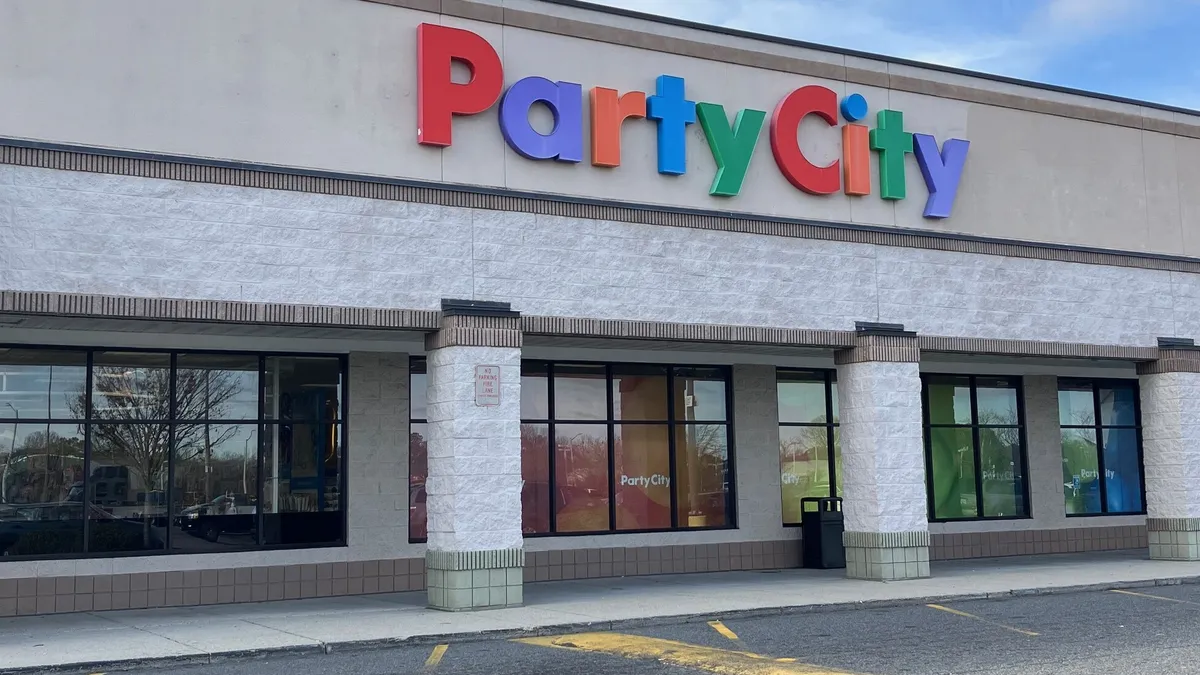Dive Brief:
- Party City Holdco on Tuesday filed for voluntary Chapter 11 bankruptcy protection. The company said in court documents that it negotiated a deal with a bondholder group to obtain a $150 million debtor-in-possession loan, part of an "expedited restructuring" that would significantly reduce debt and improve its capital structure and liquidity.
- A hearing is set for Wednesday afternoon before Judge David R. Jones in the U.S. Bankruptcy Court for the Southern District of Texas to consider emergency motions that will allow the company to continue normal operations. In its Chapter 11 petition, the company says it has liabilities and assets of $1 billion to $10 billion and 10,001 to 25,000 creditors.
- Party City has over 800 company-owned and franchised stores. But its franchised stores, Anagram balloon business and subsidiaries outside the U.S. are not part of the Chapter 11 proceedings.
Dive Insight:
Party City describes itself as “the largest vertically integrated designer, manufacturer, distributor, and retailer of party goods in North America.” In addition to its Party City stores, it also operates Halloween City seasonal pop-up stores. The company’s roots date to 1947 in the suburbs of New York City. It began in a family garage. Over the next 75 years, Party City grew through acquisitions of other companies.
Party City reached $2.35 billion in revenue in 2019. But the pandemic hit the company hard as most people canceled in-person celebrations, events and gatherings during the early months of the COVID-19 global health crisis.
As a result, the company has faced “a number of adverse events and conditions,” it said in court documents. Specifically, New Jersey-based Party City cited lockdown orders that reduced demand for the company’s primary products like costumes, decorations and tableware. Store closures hampered its ability to reach customers. Inflation hit 40-year highs.
Those factors, along with an ongoing shortage of helium for balloons – one of Party City’s signature products – “ultimately proved to be more than the company could bear,” David Orlofsky, managing director of restructuring firm AlixPartners, wrote in court documents.
On Wednesday, a judge is scheduled to hear first-day motions that will allow the company to maintain its operations and uphold its commitments to its stakeholders. These include requests to continue to pay employees and suppliers.
Party City Holdco reported total consolidated operating revenues of approximately $2.17 billion for the fiscal year ending Dec. 31, 2021, with the retail segment accounting for approximately 81.5% of total revenues. The consumer products segment made up the balance.
“In its last update, Party City revealed that debt levels topped $1.7 billion – an eyewatering amount that burdened the company with high interest payments and a lack of headroom in raising desperately needed new cash,” Neil Saunders, managing director of GlobalData, said in emailed comments. “This made the firm extremely vulnerable as it navigated first the challenges of the pandemic and then a changing market and made losses in the process of doing so.”
At the time of its IPO in 2015, Party City was owned by private equity firm Thomas H. Lee Partners. Even then the retailer had a large debt load, standing at $2.2 billion.
“While debt has been a factor in Party City’s demise,” Saunders said, “it is not the only problem. A downswing in demand for party products has also put pressure on the business. Much of this is down to two factors: increased competition and a more constrained consumer.” In Q3 of 2022, Party City reported net sales of $502.2 million, down 1.6% year over year. The company also reported a net loss of $373 million that quarter. The company has not yet reported its Q4 or 2022 annual earnings.
The New York Stock Exchange notified the company in December it faced delisting after Party City’s average closing share price slipped below $1.00 over a 30-day trading period. At the time of this story’s publication, Party City’s stock was trading at 37 cents per share.
“In the face of pandemic headwinds, a global supply chain crisis, and other macroeconomic challenges that have faced our industry, we have made significant strides in [Party City’s] ongoing transformation – establishing a solid foundation for long-term growth and continued success as the market leader in the celebrations space,” Party City CEO Brad Weston said in a statement.
A key goal of the restructuring is to strengthen the company’s finances by reducing Party City’s debt and optimizing its capital structure and liquidity. These moves would help strengthen the company’s financial position. In messages to customers, suppliers and investors, the company sought to reassure all stakeholders that it intends to continue regular business operations and exit bankruptcy.
“We plan to continue honoring store credits, special offers, and promotions, and we anticipate no changes to our policies regarding returns, exchanges, refunds, and the like,” the company said in a message to customers.
The company issued a similar message to suppliers.
“Throughout this process, we will operate as usual and our supplier relationships will remain essential,” Peter Smith, the company’s chief operations officer, wrote in a message to suppliers. “Party City is open for business, both in-store and online, and we will rely on our valued supplier network to ensure that we continue offering the same amazing product selection to our retail and wholesale customers across all of our businesses and brands.”
Party City said it expects to complete restructuring in the second quarter of this year.
“There is likely still something of a role for Party City, but the company needs to financially restructure and to rethink its approach,” Saunders said. “This includes looking at how it reaches customers. Many stores are in sub-optimal locations which are poor at driving passing trade and its web presence is reasonable but far from compelling. Ranges could also do with a lot of reinvigoration.”
“All of these things should have been addressed a long time ago. However, Party City has been neglectful which has ultimately resulted in today’s bankruptcy,” Saunders said.
















